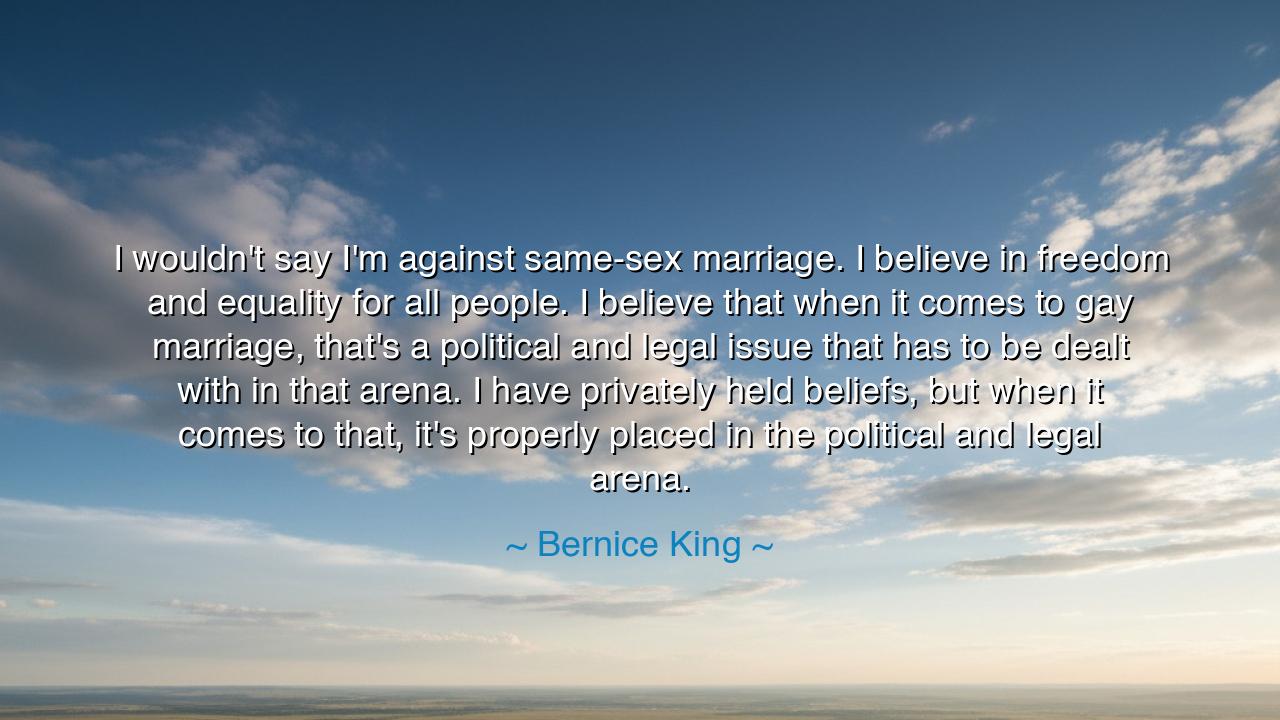
I wouldn't say I'm against same-sex marriage. I believe in
I wouldn't say I'm against same-sex marriage. I believe in freedom and equality for all people. I believe that when it comes to gay marriage, that's a political and legal issue that has to be dealt with in that arena. I have privately held beliefs, but when it comes to that, it's properly placed in the political and legal arena.






"I wouldn't say I'm against same-sex marriage. I believe in freedom and equality for all people. I believe that when it comes to gay marriage, that's a political and legal issue that has to be dealt with in that arena. I have privately held beliefs, but when it comes to that, it's properly placed in the political and legal arena." Thus spoke Bernice King, daughter of the great civil rights leader, her words carrying the careful balance of conviction, compassion, and respect for law. She acknowledges the tension between private belief and public duty, between the realm of the personal conscience and the larger political and legal arena where society’s rules are forged. Her statement is not a retreat, but a wisdom-filled recognition that in a pluralistic world, justice must be worked out through shared structures rather than personal dogma.
The origin of this wisdom lies in the long struggle for freedom and equality in America. Bernice King, born into the legacy of Dr. Martin Luther King Jr., inherited both the fire of faith and the burden of justice. Her father spoke of a dream where all men and women would be judged not by the color of their skin but by the content of their character. Bernice extends this vision into a new age, where debates over marriage, sexuality, and civil rights call forth the same fundamental question: how do we ensure equality for all people while respecting the diversity of belief? Her words show that she recognizes this struggle is not merely moral or religious, but must be decided where all can participate—through law and politics.
Consider the long battle over interracial marriage in the United States. For centuries, it was condemned, outlawed, even punished. Many opposed it on religious or cultural grounds, but in 1967, the Supreme Court’s ruling in Loving v. Virginia struck down those bans, declaring marriage a basic civil right. Those who had private opposition were still free to hold their beliefs, but the political and legal arena declared that the state could not deny that right. Bernice King’s words echo this history: that some issues, however divisive, must be decided in the shared realm of law, where rights can be protected beyond the boundaries of personal opinion.
Her reflection is also deeply human. She admits to having privately held beliefs, as every individual does. Yet she distinguishes between the private self and the public order. This is the wisdom of humility, for she does not claim her personal convictions should rule the lives of others. Instead, she honors the structures of democracy, where debate, legislation, and judgment are the instruments by which society shapes its course. In this, she teaches us the balance between conscience and community, between what one believes and what the law must guarantee to all.
There is also a heroic honesty in her words. For to say, “I believe in freedom and equality for all people” is to take a stand in continuity with her father’s legacy. It is to declare that whatever one’s private views, no group of people should be stripped of dignity, voice, or protection. By placing the matter of marriage in the political and legal arena, she affirms that equality under the law must be the bedrock, even when society disagrees. In this, she upholds the principle that the law must serve as guardian for the vulnerable, not as weapon of exclusion.
The lesson is clear: learn to separate personal conviction from public justice. In a diverse and pluralistic world, unity cannot be built on demanding that all share the same beliefs. It must be built on ensuring that all share the same rights. Bernice King teaches us that it is possible to honor one’s conscience without denying others their liberty, to walk with faith while allowing law to safeguard equality for all.
What practical steps must we take? Defend the institutions that uphold fairness, ensuring that debates about rights remain in the legal and political arena, not left to the whims of prejudice or unchecked power. Speak with honesty about your own beliefs, but listen with humility to the voices of others. Support laws that strengthen freedom and equality, even when you may not fully agree, for justice is not about one person’s conscience, but about the dignity of all.
So let Bernice King’s words endure: freedom and equality for all people must be upheld in the public sphere, even as private beliefs are honored in the personal heart. In this balance lies the wisdom of democracy, the strength of justice, and the possibility of peace in a divided world.






AAdministratorAdministrator
Welcome, honored guests. Please leave a comment, we will respond soon